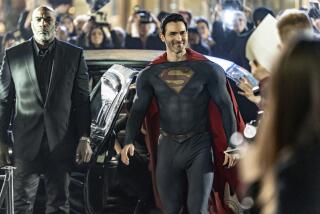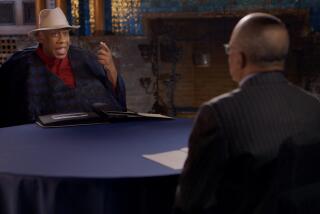Severino & Prime: A Winning Ticket
- Share via
When Bill Daniels hired John Severino to head his Prime Ticket network a little more than a year ago, there were some doubters.
Sure, Severino was once the president of the ABC-TV network and served two different stints as the general manager of KABC-TV, but what did he know about cable television?
When Severino was at KABC, some people said he was controversial. Others were less kind.
A couple of years ago, he got into trouble with the Nielsen rating service when he had KABC do a feature on Nielsen families--the ones who determine ratings--in an obvious ploy to get those families to watch his station and artificially drive up its ratings.
What shenanigans would he pull now? Would he turn Prime Ticket into another Eyewitless News, which is what critics have called KABC’s Eyewitness News?
But Severino appears to be on his best behavior these days.
He joined Prime Ticket on Columbus Day 1988. He hasn’t exactly discovered any new frontiers, but things are happening at Prime Ticket, mostly for the better.
When Prime Ticket was launched in October 1985, it had 680,000 cable subscribers, and its subscriber base was 2.9 million when Severino came aboard.
It now has nearly 4 million and, in just over four years, has become the largest of the nation’s 32 regional sports networks.
Prime Ticket has even surpassed the 20-year-old Madison Square Garden network, which has 3.4 million subscribers.
Daniels gives some credit for Prime Ticket’s growth to former president Tony Acone, who is still with the company.
“Tony’s area of expertise is in working with affiliates,” Daniels said. “What we needed was someone who could build sales and someone who also knows the politics involved in the local market. Sev supplied that missing ingredient.
“It cost me a lot of money to get him, but it’s been worth it.”
Severino’s salary reportedly is in the $500,000-a-year range, hefty for cable television, and he also owns a percentage of the company--eventually 5%.
Jerry Buss, formerly an equal partner, owns 15%, with Daniels holding the rest.
Sports is not something new for Severino. He was a lineman on the football team at Connecticut, then a graduate assistant coach at the university and later the coach of a semipro team in Portland, Me.
The owner of the team also owned the town’s TV station, and during the off-season Severino sold ads for the station.
“I’ve come full circle,” Severino said before speaking at a morning panel session of the Western Cable Television Convention in Anaheim Thursday. “I got into television because of sports, and now, because of television, I’m back in sports.”
In the 1987-88 season, Prime Ticket televised 350 sports events.
Under Severino, in 1988-89, the company televised 600 sports events, as well as numerous preview, review and magazine shows.
“It’s Your Call,” with Bill MacDonald, is a good example of the well-produced shows Prime Ticket now offers.
“I’m having the time of my life,” Severino said. “Nothing I’ve ever done in television has been this much fun, this rewarding. When I was at ABC, it was a big corporation. If you wanted to get something done, it took corporate approval. Here we just do it.”
Severino, besides signing longtime USC announcer Tom Kelly to an exclusive contract, hired key people away from KABC, including program director Don Corsini, engineering expert Bob Bellici and ad man Mike Kincaid.
When Severino started at Prime Ticket, there was no sales department. The job of selling commercials was handled by an outside firm.
In the pre-Severino era, 75% of Prime Ticket’s revenue came from subscribers, 25% from commercials. It’s now closer to 50-50, and Severino said he hopes--and this may be just wishful thinking--that the breakdown eventually will be 75% from commercials, 25% from subscribers.
Prime Ticket’s biggest expense is rights fees. The company pays out $6.2 million a year, with the Lakers getting nearly $3 million and the Kings more than $2 million. Most of the rest goes to the Pacific 10 Conference, USC and UCLA.
The company has yet to show an annual profit.
“We should be showing a profit by the end of 1990,” Severino said.
Severino’s immediate goals were to: (1) increase sales, (2) improve graphics and the overall look of production and (3) improve programming.
“We wanted to look like a major network,” Severino said, “and I think we’ve accomplished that.”
Severino has also responded to complaints from viewers. For example, according to Severino, there will be no more 10 p.m. start times for King telecasts.
“There were a few of those left on the schedule, but we killed them,” he said. “No hockey telecasts will begin later than 6:30 or 7.”
The worst thing about those 10 p.m. starts was that some cable companies cut off their Prime Ticket channel at midnight and switched over to a shopping channel.
But those snafus should disappear since, beginning Jan. 1, Prime Ticket will expand its programming to a nightly signoff of 2:15 a.m.
Among Prime Ticket’s plans for 1990 are news programs at 6 and 11 p.m., probably starting in September.
As for this year, Severino said Prime Ticket will televise a USC-UCLA football marathon on Christmas Day, 11 a.m. to 11 p.m. Nothing but USC-UCLA football games for 12 consecutive hours.
Speaking of the future, Severino said the one thing Prime Ticket is missing is baseball, but about the only way it could lure the Dodgers and Angels away from Sports Channel would be to start a separate pay channel. He said that’s a possibility down the road.
TV-Radio Notes
There will be five NFL games televised in Los Angeles this weekend, beginning Saturday at 9:30 a.m. with Dallas at the New York Giants on CBS, with Verne Lundquist and Terry Bradshaw reporting. At 1 p.m. on NBC it will be Denver at Phoenix, with Marv Albert and Bob Trumpy calling the action. The Sunday lineup: Minnesota at Cleveland on CBS at 10 a.m., with Dick Stockton and Dan Fouts; Buffalo at San Francisco on NBC at 1 p.m., with Dick Enberg and Bill Walsh, and the Raiders at Seattle on ESPN and Channel 11 at 5 p.m., with Mike Patrick and Joe Theismann.
According to pay-view distributor Rick Kulis, the Sugar Ray Leonard-Roberto Duran fight grossed $75 million nationally, including $5.5 million locally--topping the $55 million and $5.2 million that June’s Leonard-Thomas Hearns fight brought in. . . . Shame on Channel 4. The station’s promotional spots for “Sunday Night Sports” last weekend said Fred Roggin would be on. So you stay up to watch and what do you get? Mike Smith, of all people. The station fired Smith, but for some reason still brings him back occasionally. . . . Someone should tell Smith that North Carolina State is not the Tar Heels. He had the Tar Heels being put on probation the other night.
Recommended viewing: If you didn’t see Bud Greenspan’s “16 Days of Glory: Seoul ‘88” the first time it was shown on the Disney Channel, mark down these other play dates: Saturday at 10 p.m., next Thursday at 12:30 a.m. and Dec. 30 at 12:30 p.m. Never mind that the Olympic Games took place over a year ago, this film is a tremendously moving and entertaining piece of work. . . . Lyle Alzado has replaced Jim Valvano as the host of the Steve Rotfeld-produced show, “The Lighter Side of Sports,” which is carried by ESPN. Alzado didn’t fare too well as a commentator for NBC, but this role seems to be more suited to his talents.
More to Read
The biggest entertainment stories
Get our big stories about Hollywood, film, television, music, arts, culture and more right in your inbox as soon as they publish.
You may occasionally receive promotional content from the Los Angeles Times.










